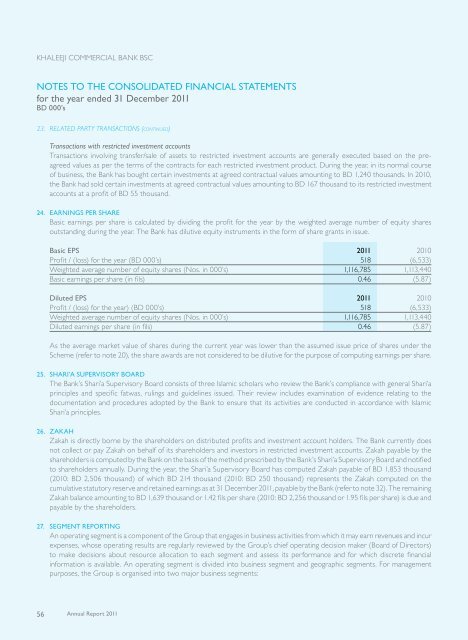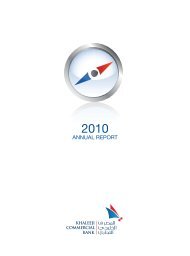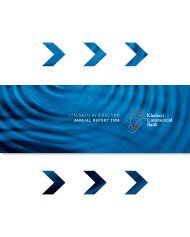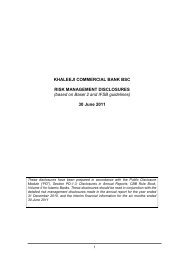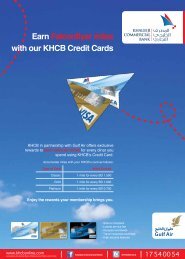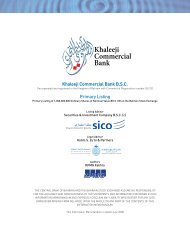2011 Annual Report - Khaleeji Commercial Bank BSC
2011 Annual Report - Khaleeji Commercial Bank BSC
2011 Annual Report - Khaleeji Commercial Bank BSC
Create successful ePaper yourself
Turn your PDF publications into a flip-book with our unique Google optimized e-Paper software.
KHALEEJI COMMERCIAL BANK <strong>BSC</strong><br />
NOTES TO THE CONSOLIDATED FINANCIAL STATEMENTS<br />
for the year ended 31 December <strong>2011</strong><br />
BD 000’s<br />
23. RELATED PARTY TRANSACTIONS (continued)<br />
Transactions with restricted investment accounts<br />
Transactions involving transfer/sale of assets to restricted investment accounts are generally executed based on the preagreed<br />
values as per the terms of the contracts for each restricted investment product. During the year, in its normal course<br />
of business, the <strong>Bank</strong> has bought certain investments at agreed contractual values amounting to BD 1,240 thousands. In 2010,<br />
the <strong>Bank</strong> had sold certain investments at agreed contractual values amounting to BD 167 thousand to its restricted investment<br />
accounts at a profit of BD 55 thousand.<br />
24. EARNINGS PER SHARE<br />
Basic earnings per share is calculated by dividing the profit for the year by the weighted average number of equity shares<br />
outstanding during the year. The <strong>Bank</strong> has dilutive equity instruments in the form of share grants in issue.<br />
Basic EPS <strong>2011</strong> 2010<br />
Profit / (loss) for the year (BD 000’s) 518 (6,533)<br />
Weighted average number of equity shares (Nos. in 000’s) 1,116,785 1,113,440<br />
Basic earnings per share (in fils) 0.46 (5.87)<br />
Diluted EPS <strong>2011</strong> 2010<br />
Profit / (loss) for the year) (BD 000’s) 518 (6,533)<br />
Weighted average number of equity shares (Nos. in 000’s) 1,116,785 1,113,440<br />
Diluted earnings per share (in fils) 0.46 (5.87)<br />
As the average market value of shares during the current year was lower than the assumed issue price of shares under the<br />
Scheme (refer to note 20), the share awards are not considered to be dilutive for the purpose of computing earnings per share.<br />
25. SHARI’A SUPERVISORY BOARD<br />
The <strong>Bank</strong>’s Shari’a Supervisory Board consists of three Islamic scholars who review the <strong>Bank</strong>’s compliance with general Shari’a<br />
principles and specific fatwas, rulings and guidelines issued. Their review includes examination of evidence relating to the<br />
documentation and procedures adopted by the <strong>Bank</strong> to ensure that its activities are conducted in accordance with Islamic<br />
Shari’a principles.<br />
26. ZAKAH<br />
Zakah is directly borne by the shareholders on distributed profits and investment account holders. The <strong>Bank</strong> currently does<br />
not collect or pay Zakah on behalf of its shareholders and investors in restricted investment accounts. Zakah payable by the<br />
shareholders is computed by the <strong>Bank</strong> on the basis of the method prescribed by the <strong>Bank</strong>’s Shari’a Supervisory Board and notified<br />
to shareholders annually. During the year, the Shari’a Supervisory Board has computed Zakah payable of BD 1,853 thousand<br />
(2010: BD 2,506 thousand) of which BD 214 thousand (2010: BD 250 thousand) represents the Zakah computed on the<br />
cumulative statutory reserve and retained earnings as at 31 December <strong>2011</strong>, payable by the <strong>Bank</strong> (refer to note 32). The remaining<br />
Zakah balance amounting to BD 1,639 thousand or 1.42 fils per share (2010: BD 2,256 thousand or 1.95 fils per share) is due and<br />
payable by the shareholders.<br />
27. SEGMENT REPORTING<br />
An operating segment is a component of the Group that engages in business activities from which it may earn revenues and incur<br />
expenses, whose operating results are regularly reviewed by the Group’s chief operating decision maker (Board of Directors)<br />
to make decisions about resource allocation to each segment and assess its performance and for which discrete financial<br />
information is available. An operating segment is divided into business segment and geographic segments. For management<br />
purposes, the Group is organised into two major business segments:<br />
56<br />
<strong>Annual</strong> <strong>Report</strong> <strong>2011</strong>


